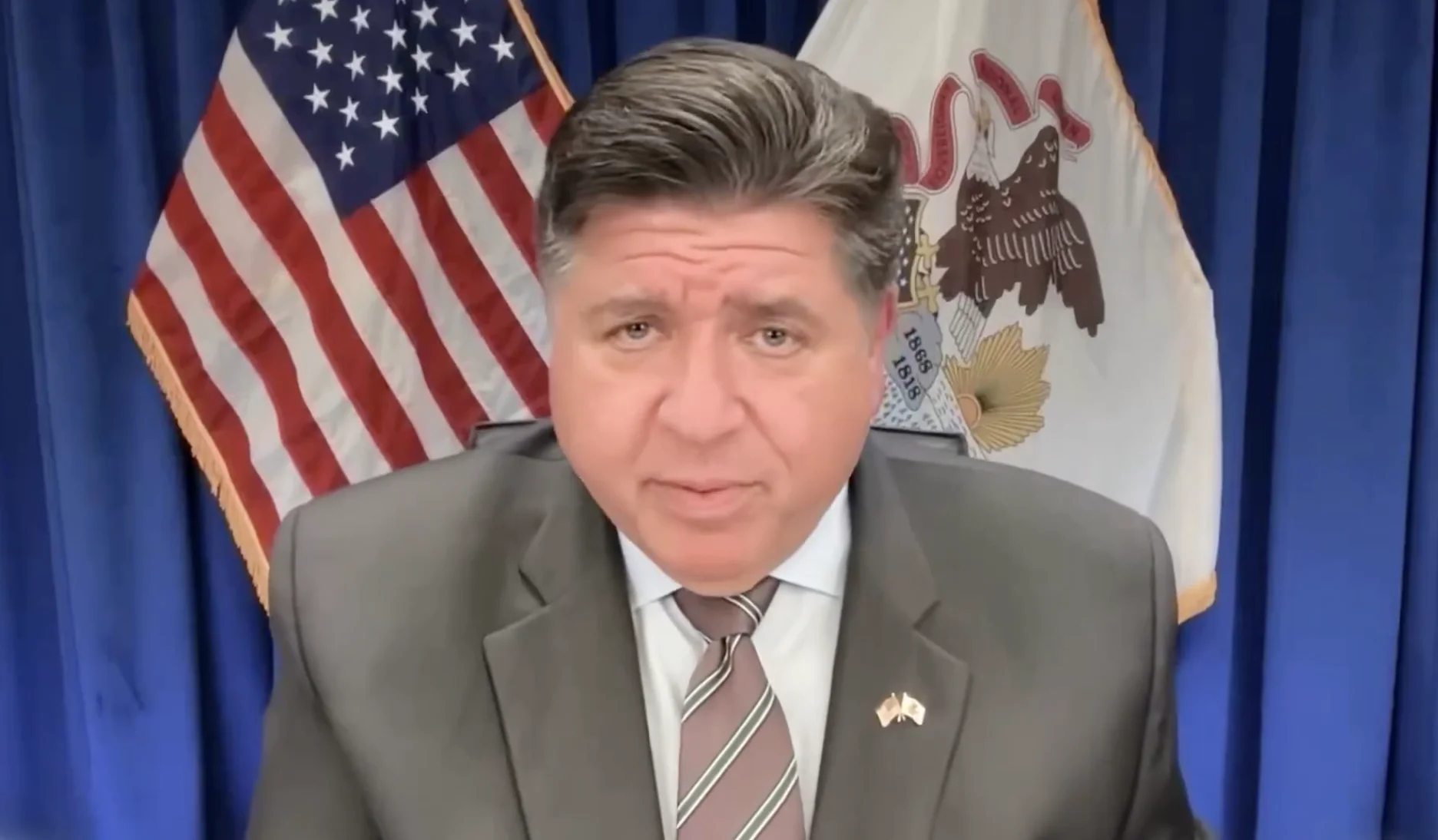Illinois Gov. J.B. Pritzker addresses DOJ voter data requests amid debates over election integrity. Illinois has a history of issues with voter rolls, including fraudulent registrations and votes by deceased individuals. | X / Marco Foster
Illinois Gov. J.B. Pritzker addresses DOJ voter data requests amid debates over election integrity. Illinois has a history of issues with voter rolls, including fraudulent registrations and votes by deceased individuals. | X / Marco Foster
Stephen Miller, advisor to President Donald Trump, has accused Illinois Gov. J.B. Pritzker of refusing a Department of Justice request to remove non-citizens from the state’s voter registration rolls. Miller’s allegation comes amid a broader dispute over a DOJ data request for voter information from all states.
“DOJ asked you to remove illegal alien voters from the rolls and you refused,” Miller wrote in an X post directed at Illinois officials.
Miller’s comment responded to a video clip of Pritzker raising concerns about the DOJ’s request.

Stephen Miller, advisor to President Donald Trump, said Illinois refused to remove non-citizens from voter rolls following a Department of Justice data request.
| X / Stephen Miller
“They demanded, the DOJ did, our voter data, not just ours in Illinois, every state's voter data,” Pritzker said. “Why? They won't tell us why. And actually what they seem to be looking for, remember back to the 2020 elections, is they want to be able to find voter fraud, which lots of organizations have been looking for voter fraud, as you know, for a long time.”
Miller characterized the DOJ's data collection effort as targeting illegal voting, a claim Illinois officials have denied, citing privacy laws and constitutional protections.
The DOJ has filed lawsuits against states including Maine and Oregon for failing to comply with the request. Illinois, while not yet sued, remains under scrutiny.
Illinois declined to provide the DOJ with any voter data beyond what is publicly available and has faced scrutiny over the integrity of its voter rolls. Concerns increased after a 2020 programming error in the state’s Automatic Voter Registration (AVR) system led to hundreds of non-citizens being mistakenly registered to vote, with at least 16 reportedly casting ballots in the 2018 election.
The state says those registrations were reversed, but critics remain skeptical.
Illinois’ AVR system, supported by Democrats as a tool to increase civic participation, has faced criticism from election integrity advocates who warn that non-citizens may unknowingly register to vote, especially in multilingual settings.
Signs posted in 2024 at Cook County DMV offices by the Illinois Secretary of State offer voter registration information in Chinese, Hindi, Polish, Spanish, and Urdu—languages not required for naturalization under U.S. law.
The U.S. Citizenship and Immigration Services states that knowledge of English is mandatory for the naturalization interview, raising questions about how some non-English speakers could legally be voters.
“People who don’t speak English often do not understand that they have to 'opt-out.' They are not informed that it is against federal law for non-citizens to register to vote and/or to vote,” Carol Davis, Illinois Conservative Union chairman, told Center Square. “Everytime someone touches a federal agency in any way they are getting a voter registration form shoved in their face.”
Pritzker linked the voter data demand to a broader plan to “undermine confidence in elections” ahead of upcoming federal elections.
“You're gonna have soldiers or people dressed as soldiers at polling places saying we're protecting your voting rights. You know, this is about voter integrity,” Pritzker said.
Confidence in Illinois election integrity has been low for some time. Illinois’ voter rolls have been criticized for being unkempt. Earlier this year, the U.S. Department of Justice filed a statement of interest in a lawsuit accusing Illinois of violating the National Voter Registration Act by failing to properly maintain its voter registration rolls.
The lawsuit, filed by Judicial Watch, argues Illinois illegally delegates the responsibility of purging ineligible voters to local election officials instead of maintaining centralized oversight at the state level. Plaintiffs cite federal data showing 23 Illinois counties reported removing few or no voters over two years despite nearly a million registered voters, calling the figures “absurdly small.”
The DOJ maintains states, not local jurisdictions, are responsible for accurate voter rolls, citing NVRA language assigning that duty to the state. Illinois officials say they follow a “bottom-up” system with local election authorities managing voter lists, which they say complies with the law.
Two unions that generally support left-leaning interests, the Illinois AFL-CIO and the Illinois Federation of Teachers, joined the defense, expressing concern that “overly aggressive” purging could disenfranchise their members.
Democrats have controlled most major offices and both houses of the General Assembly in recent decades.
The last time Republicans controlled state politics completely was after the 1940 election, when they won every statewide office and gained a majority in both chambers.
The last Republican mayor of Chicago was William Hale “Big Bill” Thompson, first elected in 1915 and serving multiple terms.
In the 1960 presidential election, allegations of voter fraud centered on Illinois, where John F. Kennedy won by fewer than 9,000 votes. Republicans accused Chicago Mayor Richard J. Daley’s political machine of manipulating vote totals in Cook County. It has been reported that Nixon privately believed the election was stolen but declined to contest publicly, citing constitutional concerns.
The Nixon Recount Committee cited corruption in Cook County and called for an investigation, but Kennedy’s narrow win was certified. Investigations and recounts uncovered irregularities. One lawsuit claimed votes were cast by deceased individuals, calling them “Kennedy voters from the cemeteries of Chicago.”
The issue of “zombie” voters is not limited to decades ago.
A 2016 CBS Chicago investigation uncovered 119 deceased individuals who had “voted” 229 times, mostly in Chicago. Election officials attributed this to clerical errors.
Former state representative Dan Caulkins referenced the problem.
“I make a little stupid joke about the Democrats in Springfield proposing legislation that would make fences around cemeteries illegal because it's hard to register people to vote,” Caulkins told Prairie State Wire.
Concerns about Illinois’ voter rolls continue today.
In 2024, alarms were raised about the AVR system after concerns that illegal immigrants could be inadvertently registered to vote when applying for driver’s licenses.
In response, the Illinois legislature passed SB 496, expanding the AVR program to include applicants for both standard driver’s licenses and REAL IDs, while implementing safeguards to prevent non-citizens from being automatically enrolled.
The legislation introduced a “backend” process where individuals are registered to vote unless they actively opt out, a process some lawmakers say may raise constitutional concerns about consent and the right not to participate.
Also in 2024, state lawmakers passed HB 3882, allowing undocumented residents to obtain standard four-year driver’s licenses and ID cards, replacing the Temporary Visitor’s Driver’s License.
Applicants must pass a driving test, have valid insurance, and provide proof of residency for at least one year. The new licenses bear the phrase "Federal Limits Apply" to prevent noncitizens from voting.
“Since it is a felony to register to vote or vote in federal elections, if they find that that registration was not legal then those people can be removed from the rolls immediately,” Davis told Advantage News. “They can use these laws to remove them [non citizens] from the rolls.”
There have been cases in Illinois where illegal aliens registered to vote when obtaining driver’s licenses have been deported.




 Alerts Sign-up
Alerts Sign-up